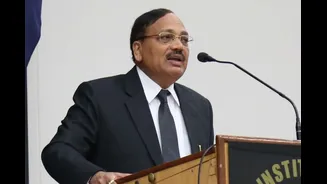Chief Justice of India BR Gavai on Monday formally sent the name of Justice Surya Kant to the Centre for approval, paving the way for the senior Supreme Court judge to assume the country’s top judicial
post. Justice Surya Kant will become the 53rd Chief Justice of India after CJI Gavai’s retirement on November 23.
Born on February 10, 1962, in Haryana’s Hisar, Justice Surya Kant comes from a modest, middle-class family in a region not often in the spotlight of India’s judicial elite. As per Bar and Bench, he pursued his undergraduate education at Government Post Graduate College, Hisar, and earned his law degree from Maharishi Dayanand University, Rohtak, in 1984.
After obtaining his law degree, Justice Surya Kant began his practice at the district court in Hisar in 1984. Within a year, in 1985, he moved his practice to the Punjab & Haryana High Court, specialising in constitutional, service and civil matters. His advocacy credentials grew rapidly: by 2000 (approximately at age 38), he had been appointed as the Advocate General of Haryana, making him one of the youngest to hold that position in the state. In March 2001, he received the designation of Senior Advocate.
On January 9, 2004, Justice Surya Kant was elevated as a permanent judge of the Punjab & Haryana High Court. In October 2018, he became Chief Justice of the Himachal Pradesh High Court and on May 24, 2019, he was elevated to the Supreme Court of India.
In his recommendation, CJI Gavai described Justice Surya Kant as “suited and competent in all aspects to take the helm,” further noting that both men share a social background marked by perseverance and struggle, which in CJI Gavai’s view equips Justice Surya Kant to understand the concerns of those who rely on the judiciary for protection.
Justice Surya Kant has been a member of multiple Constitution Benches in the Supreme Court and has played a key role in several significant decisions, including the 2023 judgment that upheld the abrogation of Article 370. During the course of his tenure, he has contributed to more than a thousand rulings covering areas such as constitutional interpretation, human rights, and administrative law.
At present, he serves as the Chairperson of the Supreme Court Legal Services Committee (since November 2024) and holds the position of Visitor at the National University of Study and Research in Law, Ranchi. Previously, he served two terms as a member of the National Legal Services Authority (NALSA) and continues to be associated with the Indian Law Institute.














